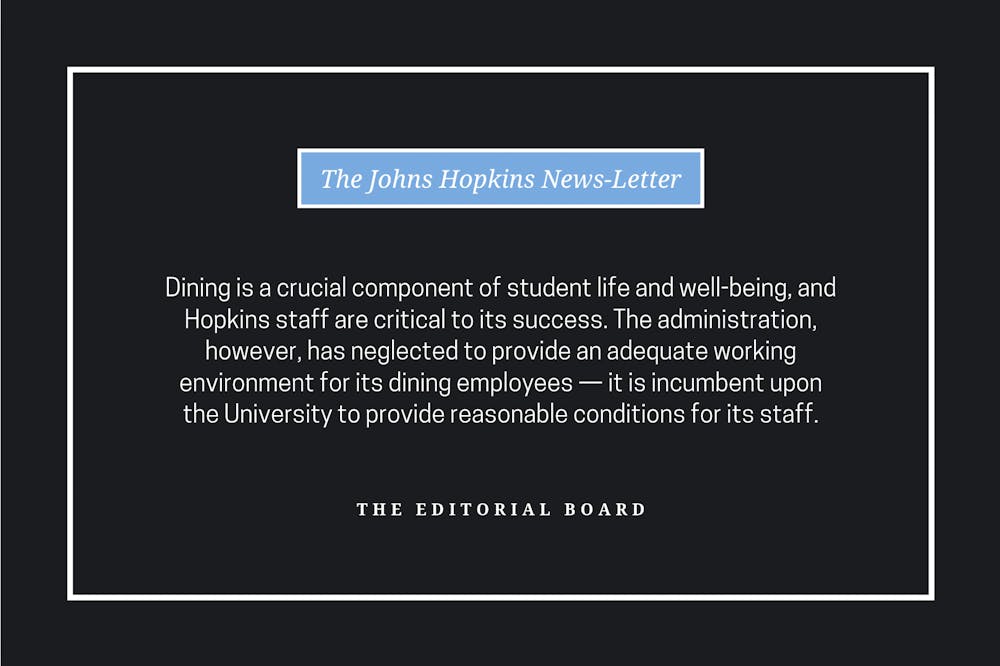Dining halls are a problem. Workers are understaffed and overworked, and students and staff have recently commented on the poor quality of food and reduced portion sizes. Dining is a crucial component of student life and well-being, and Hopkins staff are critical to its success. The administration, however, has neglected to provide an adequate working environment for its dining employees — it is incumbent upon the University to provide reasonable conditions for its staff.
While Hopkins is the seventh-ranked university in the nation, it ranked around 825 out of 1450 schools for Best College Food in America. In contrast to three of its peer institutions, Hopkins falls short: Cornell University is ranked 16th, Duke University is ranked 28th and Yale University is ranked 44th.
The News-Letter recognizes that federal funding cuts have heightened financial pressure on the University, leading to hiring freezes and other attempts to curb spending. However, we urge the administration to reconsider its priorities. As an institution that prides itself on “having one of the nation’s best campus dining programs” and on its “responsibility to [their] community and the world,” Hopkins is disregarding its core commitments.
Suboptimal dining options
Dining has been stripped of popular options and reliable service. Within the past year, the University has removed late-night hours at Hopkins Cafe and removed Scoopology and The Bun Shop from CharMar. While administrators cited low student engagement with these offerings as a justification for their removal, students protested the changes.
Food quality has also declined. In interviews with The News-Letter, dining workers reported that fresh produce has been increasingly replaced with canned or frozen food ever since the University’s departure from Bon Appétit management in 2022. Some students reported that they suffered from food poisoning after eating at dining halls. In a survey conducted by The News-Letter, one student reported that “The food made me throw up twice during my first month,” while another recommended that the University make its food options “more diverse, edible, healthier, and more student friendly.”
Workers’ experiences
Dining staff have also expressed concerns about their working conditions. In December 2024, workers noted that, after the University’s management transition, stations were frequently understaffed, which caused employees to take on more responsibilities than they expected and impacted the student dining experience. This has impacted the quality of student food and the amount of food consistently available to students.
Conditions have not changed since last December. In an interview with The News-Letter in September 2025, employees noted that they had not received sufficient compensation, despite the fact that some are required to work “multiple full-time jobs within an eight-hour shift.”
Funding cuts: The University is still responsible
The News-Letter understands that an $850 million reduction in federal funding has meaningfully impacted the University’s budget. But funding constraints are no excuse for this matter: these issues have been ongoing since before the cuts. Workers’ concerns have persisted since December 2024 and have not improved. Thus, the source of these problems — most notably, overworked staff and poor food quality — cannot be attributed to federal funding cuts. A tight budget cannot be a reason for the University to neglect the well-being of its students and staff.
Hopkins cannot continue to make excuses for its shortcomings. Both staff and students deserve accountability from the University, especially in these unprecedented times. The University’s dismissiveness concerning its treatment of essential staff is inexcusable. Students become collateral damage when the administration refuses to pay attention to and prioritize these issues, which have existed for plenty of time — in fact, almost an entire year. Yet dining hall workers continue to endure unfair working conditions and wages.
The time to resolve these issues is long overdue. The University must realign its financial priorities to reflect the importance of these individuals’ roles in creating a more welcoming campus environment.
Buse Koldas and Myra Saeed, who covered the Hopkins Dining articles cited above, were not involved in the writing or editing of this editorial.





